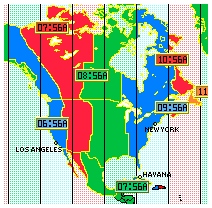Donate ·
Amazon.com · iResQ
· Advertise
|
|
|
||
|
||
 |
Dan
Knight
April 4, 2000
Two of our sons have paper routes. If my wife hadn't remembered to reset the alarm clock Saturday night, we never would have got the Sunday papers out on time.
It's that annual lunacy known as Daylight Saving Time, the time of year that we somehow believe that depriving ourselves of an hour's sleep makes sense so we can have sunlight later in the day. It's also the time of year a lot of us spend most of a week adjusting our internal clocks to the external clocks.
According to Bob Aldrich in Saving Time, Saving Energy, "By moving the clock ahead one hour, we can cut the amount of electricity we consume each day." In fact, DST cuts overall energy consumption in the U.S. by 1% during the months of Daylight Saving Time.
In addition to saving energy, DST saves lives and prevents traffic injuries, according to the Department of Transportation. They estimate 50 lives saved, 2,000 injuries prevented, and $28 million saved in traffic accident costs each year.
Daylight is also a deterrent to certain types of crime, since some crimes are more common in darkness than in daylight.
But the big benefit of DST is one they really stress here in Michigan: tourism. That extra hour of daylight gives tourists one more hour to spend money. (Okay, they may not put it so crassly.)
Of course, there's no such thing as a free lunch. DST has its share of costs.
Perhaps the greatest cost is the personal inconvenience of having your biological clock forced out of sync with your alarm clock twice a year. For a week or two after the time change, you may find it hard to get up in the morning. I do.
In April, you get to drive to work in more darkness than you had to contend with in March, thanks to DST. And because you've missed an hour's sleep and are altering your internal clock to match the external one, you're more prone to make mistakes.
In fact, studies have shown that more automotive accidents take place during the week immediately following the Spring time change than during the other weeks of the year. One study, noted on the Standard Times site, found an 8% increase in traffic accidents the Monday following "spring forward."
An article posted by Stanley Coren, Sleep Deficit, Fatal Accidents, and the Spring Shift to Daylight Savings Time, "there is a spring increase in accidents and no corresponding fall decrease in accidents following the DST shift...." and measures the increase in accidents at 17% immediately following the shift to DST.
Not only are there more accidents, but "following the spring shift to Daylight Savings Time (when one hour of sleep is lost) there is a measurable increase in the number of traffic accidents that result in fatalities."
I think the costs outweigh the benefits. Saving 1% on energy consumption at the cost of increased accidents just doesn't seem right. At least during the week after the switch to DST, the costs far outweigh the advantages.
 The
solution, obviously, is to stop switching to DST every year.
There are other ways to get that extra hour of sunlight, if
we think it's so important to have it.
The
solution, obviously, is to stop switching to DST every year.
There are other ways to get that extra hour of sunlight, if
we think it's so important to have it.
The most obvious one is to set our clocks ahead one hour during the entire year. This eliminates the "spring forward" sleep penalty completely while still saving 1% of energy consumption. For those on the East Coast, it would mean adopting Atlantic Standard Time. For those in the Mississippi Valley, we'd have Eastern Standard Time throughout the year. Or we might just want to change the definition of those time zones, since renaming Central Time as Eastern Time would certainly be confusing.
A third way to have more available daylight hours in the evening is even simpler. It doesn't involve changing time zones or resetting clocks at all. All it requires is starting and ending the workday earlier. Want an extra 90 minutes? Switch from 9:00 to 5:00 and adopt a 7:30 to 3:30 schedule. (I work 6:30 to 3:00 M-F and love it.)
There are ways to gain the evening sunlight hours we seem to want and still avoid the disruptive time changes every April and October. I would prefer any of these to the current system of Daylight Saving Time.
\r\n\r\n"; if ((isset($pool) AND isset($type)) AND (isset($ip) OR isset($ok))) { if (!isset($siteid)) $siteid="270"; if (!isset($pageid)) $pageid="0"; if (!isset($force)) $force=""; if (!isset($keywords)) $keywords=""; if (!isset($pos)) $pos=""; if (!isset($optcode)) $optcode=""; getad($siteid, $pageid, $pool, $type, $ip, $force, $keywords, $pos, $optcode); # $adr = "http://adserver1.backbeatmedia.com:6789/servlet/ajrotator/$siteid/$pageid/viewHTML?pool=$pool&type=$type&ajip=$ip"; # $success = @readfile("$adr"); } ?>
Mac of the Day
PowerBook
G4
List of the Day
Mac HomeSchool
Deal of the Day
Email Lists
Online Tech Journal
Consumer
advice, reviews
guides, deals
Apple History
Miscellaneous Links
Used Mac Dealers
Macspeak
RAM Upgrades
About Low End Mac